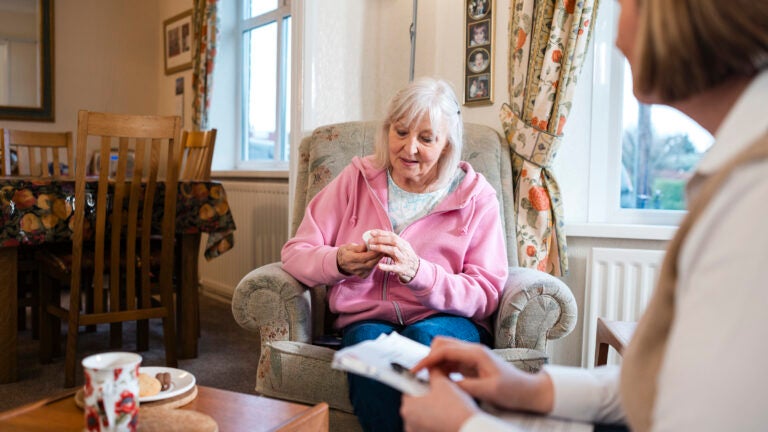
About 12 to 13 million Americans are caring for a family member with dementia. (Photo/iStock)
USC experts on Alzheimer’s, expansion of Medicare to cover in-home care
Julie Zissimopoulos examines proposal to expand Medicare to cover the costs of long-term care at home and include vision and hearing benefits for seniors.
Contact: Leigh Hopper at lhopper@usc.edu or uscnews@usc.edu
Vice President Kamala Harris’ proposal to expand Medicare to cover the costs of long-term care at home, plus vision and hearing benefits for seniors, made only a modest splash in the news. But it caught the attention of USC’s Julie Zissimopoulos, who studies the cost of dementia and the toll it takes on family members caring for persons living with dementia including those of the “sandwich generation” — adults caring for both their kids and aging parents.
Zissimopoulos, a professor at the USC Price School of Public Policy and a senior scholar at the USC Schaeffer Institute for Public Policy & Government Service, recently sat down with USC News to discuss Harris’ proposal ahead of November’s Alzheimer’s Disease Awareness Month.
What would be the impact of Harris’ proposal on families touched by Alzheimer’s or dementia?
Zissimopoulos: It would have a profound impact. People with Alzheimer’s and other dementias require help and support that changes over time. It may be 20 hours or so per week in early stages of disease, but as disease progresses, people with dementia often require around-the-clock care. Most of this is provided by family members. It is very expensive to hire a home health aide, and it is not a service currently reimbursed by Medicare.
We estimate that there are around 12 to 13 million persons caring for a family member with dementia, and that number will rise as the number of people living well into their 80s continues to grow. So that is an enormous amount of people who are impacted, and these numbers are for caring for persons with Alzheimer’s and dementia. That’s not counting caregiving for people with other conditions.
Harris’ proposal also includes coverage for vision and hearing loss. Why is that important?
Zissimopoulos: Many persons, as they age, suffer from hearing and vision loss. And there’s new evidence emerging around the relationship between hearing loss and dementia. It may be that if you can correct the hearing loss, you might actually be able to reduce or slow cognitive decline.
The proposal has been criticized as being too expensive. Your research shows that unpaid care by family members is indeed expensive, in ways that are largely hidden from the public.
Zissimopoulos: A lot of this unpaid care is provided by adult children, and many are in the prime of their working lives, so leaving the labor force has immediate as well as long-term financial consequences.
LEARN MORE
Read about Julie Zissimopoulos’ effort to build a dementia cost-of-care “calculator.”
Returning to the labor force is not always successful or at the same level of salary that you were earning before you left; your Social Security earnings accumulation and your savings for retirement through, for example, 401(k) contributions take a hit. And we know from many prior studies that not only are there financial implications of caregiving, but there are health and psychological implications.
The costs to individuals, their families and society are enormous. So [the proposal] is about what we, as a society, are willing to spend money on and who will pay for it. Right now, families are paying for it.
Other USC Alzheimer’s and dementia experts available for interviews:
Dan Nation studies how blood vessel health and circulation contribute to cognitive decline.
Andrei Irimia is an expert in genetic, epigenetic, and environmental factors on brain aging.
Paul Aisen can discuss amyloid-clearing drugs for Alzheimer’s disease. Aisen is the founding director of the Alzheimer’s Therapeutic Research Institute of USC (ATRI).
Lon Schneider is an expert on psychiatry, dementia prevention, intervention and care.
María Aranda can discuss the burden of dementia in Black and Latino populations and measures to diversify clinical trials.
Donna Benton can discuss the challenges faced by caregivers, including the aging parents of people with Down syndrome, who are susceptible to developing Alzheimer’s in middle age.
Hussein Yassine specializes in how changes in lipid metabolism and nutrition affect cognition and the risk of developing Alzheimer’s disease. He directs a new center for patients who carry the APOE4 allele, the strongest genetic risk factor for dementia.



